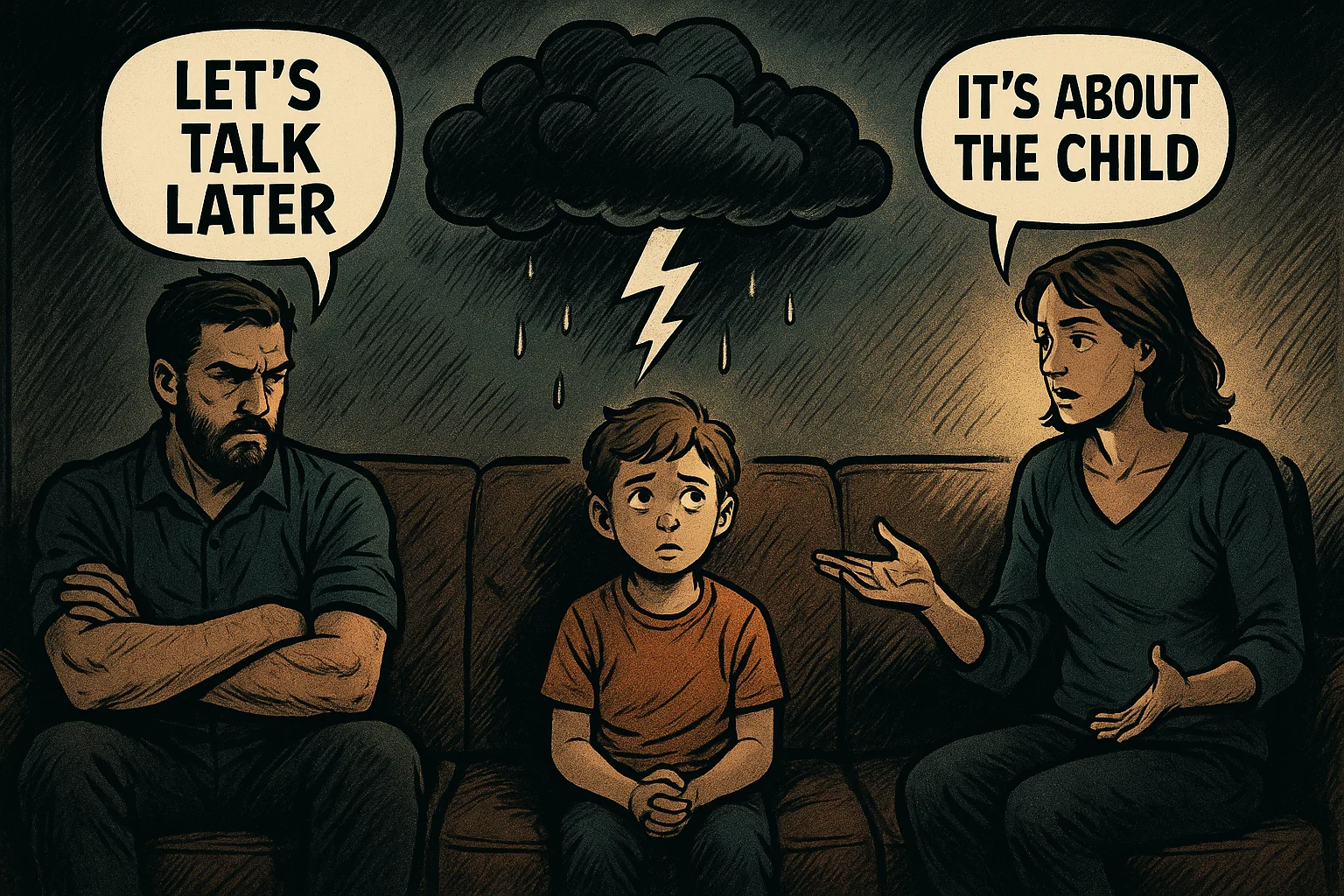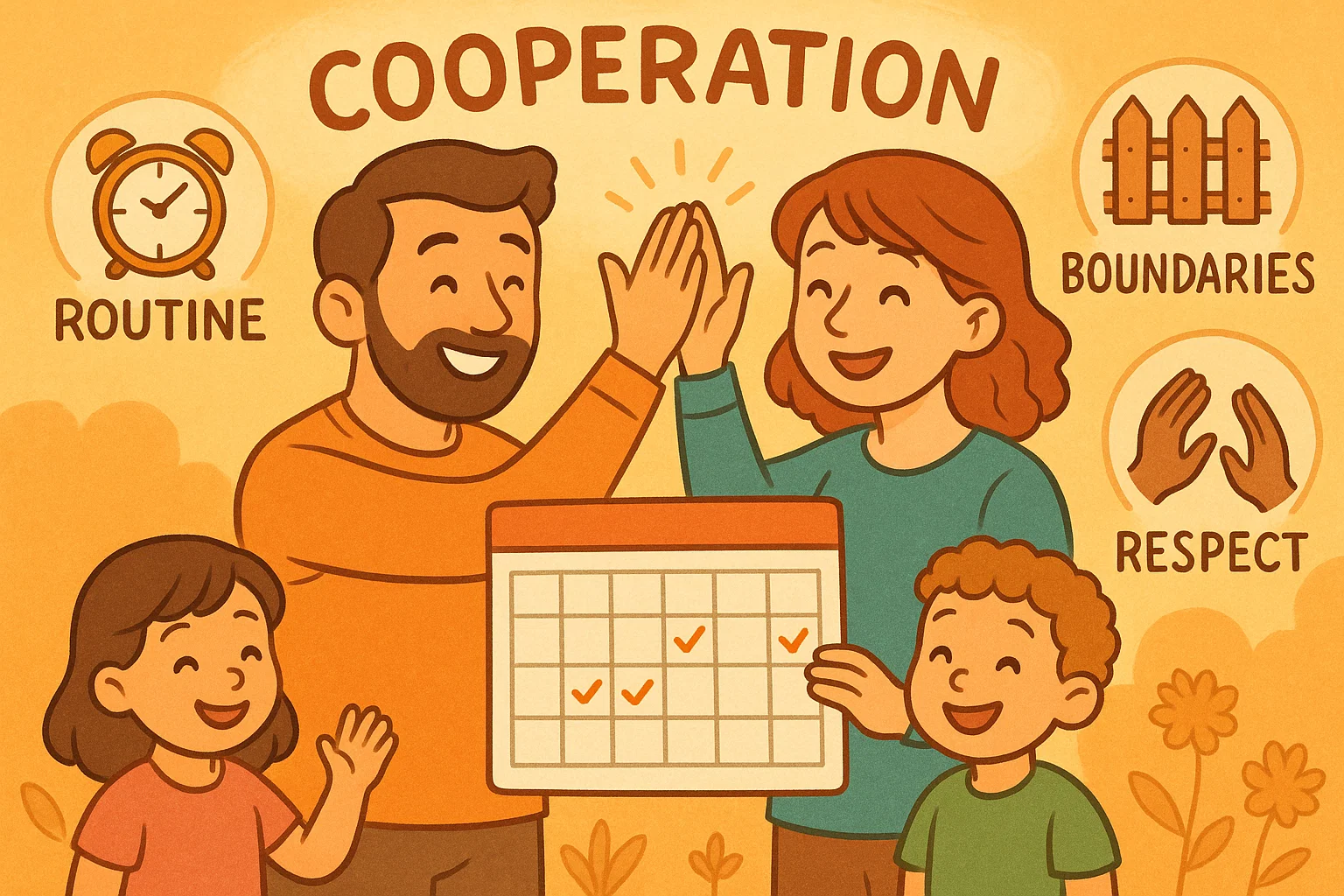Navigating your co-parenting journey as a father presents unique challenges and opportunities that can profoundly impact your child’s development and your own growth as a parent. Research consistently shows that children benefit significantly when they maintain a healthy relationship with both parents, even after separation or divorce. This comprehensive guide provides evidence-based co-parenting advice specifically tailored for dads who want to co-parent successfully.
Key Role of Dad in Co-Parenting
Positive Influence on Child’s Well-being
Father involvement creates measurable benefits for children’s development when one parent or both maintain consistent engagement. Studies indicate that children with engaged fathers demonstrate higher academic achievement, improved emotional regulation, and stronger social skills. According to the National Center for Health Statistics, children exposed to positive co-parenting relationships show 40% fewer behavioral problems compared to those in high-conflict situations.
The emotional security that comes from having both parents actively involved cannot be overstated. When dads play a consistent, nurturing role in their children’s lives, children develop stronger self-esteem and better coping mechanisms for life’s challenges. Your presence provides a different but equally valuable perspective that helps your child feel secure across both households.
Shared Responsibilities and Balance
Effective co-parenting requires dads to embrace shared responsibilities beyond traditional gender roles. This means actively participating in daily tasks like homework supervision, meal preparation, and bedtime routines. Many fathers find that their new co-parenting role actually strengthens their skills as they take on responsibilities they might not have handled during the relationship.
Discipline consistency between households becomes crucial for your child’s sense of security and understanding of expectations. When both co-parents coordinate their parenting approaches, children feel more stable and are less likely to attempt manipulating different rules between homes.
From Conflict to Collaboration
The transition from conflict to collaboration often represents the most challenging aspect of healthy co-parenting for dads. Research from the American Psychological Association suggests that fathers who successfully shift from adversarial to cooperative relationships with their ex-partners report higher satisfaction in their role as a co-parent and stronger relationships with their children.
This transformation requires recognizing that your relationship with your ex serves a different purpose than your previous romantic relationship. The focus shifts entirely to what’s best for your child, requiring you to compartmentalize personal feelings and prioritize your child’s needs above past grievances.
Top Co-Parenting Tips for Dad
Keep Communication Open and Calm
Open communication forms the foundation for co-parenting success. This means avoiding inflammatory language, staying focused on child-related topics, and choosing appropriate times and methods for discussions. Effective communication with your ex often works better through text messages or specialized platforms rather than phone calls, as they provide a record and reduce emotional reactivity.
When disagreements arise, use “I” statements to express concerns without attacking your co-parent. For example, “I’m concerned about bedtime consistency” works better than “You never follow the schedule.” This approach keeps communication channels open and demonstrates respect for your co-parenting partnership.
Respect Routines and Schedules
Consistency between homes provides stability for your children during a time of significant change. This means honoring pickup and drop-off times, maintaining similar bedtime routines, and coordinating homework expectations. Children thrive on predictability, and your reliability in these areas builds trust and security.
Create a shared calendar system that both parents can access and update. This transparency reduces misunderstandings and helps everyone stay informed about important events, activities, and schedule changes. It’s a good idea to establish these systems early in your co-parenting journey.
Avoid Using Kids as Messengers
Using children to communicate with your co-parent places them in an inappropriate position and can cause significant emotional harm. Children shouldn’t be responsible for conveying important information, complaints, or requests between parents. This practice creates anxiety and forces children to choose sides in adult conflicts.
Instead, establish direct channels to talk to your ex through text, email, or co-parenting platforms. If direct communication proves difficult, consider using a neutral third party or mediator to facilitate important discussions while keeping children out of adult business.
Set Clear Boundaries and Expectations
Clear communication about boundaries protects everyone involved in your co-parenting situation. This includes establishing rules about communication frequency and methods, decision-making processes for important matters, and appropriate interactions with new partners. These boundaries aren’t meant to be restrictive but rather to create a framework for respectful co-parenting.
Document your arrangements to include specifics about holidays, vacations, medical decisions, and educational choices. Having these expectations clearly outlined reduces potential conflicts and provides a reference point when disagreements arise about orders and parenting agreements.
Be Flexible When Plans Change
Life inevitably brings unexpected changes, and good co-parenting requires flexibility from both parents. When your co-parent requests schedule adjustments for legitimate reasons, try to accommodate when possible. This flexibility demonstrates good faith and often results in reciprocal consideration when you need changes.
However, flexibility shouldn’t mean accepting chronic unreliability or manipulation. Establish guidelines for what constitutes reasonable requests and maintain consistency in your expectations while remaining open to genuine emergencies or important opportunities for your child.
Focus on Long-Term Co-Parenting Goals
Successful co-parenting requires keeping the bigger picture in mind. Your child may benefit from having both parents present at graduations, weddings, and other significant life events. Working toward this long-term vision helps you navigate current challenges with perspective and patience.
Create shared goals for your child’s development, such as academic achievement, character building, and emotional health. When both parents align around these objectives, individual disagreements become easier to resolve because you’re working toward common outcomes that prioritize the well-being of your children.

Emotional Resilience and Mental Health for Dads
Managing Stress and Guilt
Many dads feel unique emotional challenges during co-parenting, including guilt about the family structure change, stress about reduced time with children, and frustration with loss of control over daily decisions. These feelings are normal and don’t reflect failure as a father – they’re part of the natural parenting process during family transitions.
Develop healthy coping strategies such as regular exercise, mindfulness practices, or talking with trusted friends. Professional counseling can provide valuable tools for processing emotions and developing effective strategies. Remember that taking care of your mental health directly benefits your children and helps you stay emotionally present.
Don’t Be Afraid to Make Mistakes
Your co-parenting journey involves a significant learning curve, and mistakes are inevitable. Rather than striving for perfection, focus on learning from experiences and gradually improving your approach. Children benefit from seeing parents who can acknowledge mistakes, apologize when appropriate, and make positive changes.
Document what works and what doesn’t in your approach. This self-reflection helps you identify patterns and make adjustments that benefit everyone involved. Your willingness to grow and adapt models valuable life skills for your children.
Build Your Support Network
Isolation can make challenges feel overwhelming. Connect with other fathers in similar situations through online forums, local support groups, or fatherhood programs. These connections provide practical co-parenting advice, emotional support, and reminder that you’re not alone in this journey.
Consider professional support through individual therapy or counseling focused on family transitions. Mental health professionals can provide valuable tools and perspectives that improve your effectiveness and personal well-being.
Avoid Bitterness Toward the Co-Parent
Harboring resentment toward your co-parent ultimately hurts your children and your own emotional health. While processing feelings about the relationship ending is important, allowing bitterness to influence decisions creates ongoing conflict that children inevitably absorb.
Focus on what you can control: your own behavior, communication style, and choices. When you maintain a respectful approach regardless of your co-parent’s behavior, you model emotional maturity and protect your children from unnecessary conflict. Remember, positive things about your ex can still exist even after your relationship ended.
Child-Centered Approach in a Split Household
Be Present and Involved
Quality time with your children matters more than quantity. When they’re with you, put away distractions and focus on meaningful interactions. This might mean engaging in their interests, helping with homework, or simply having conversations about their day and feelings.
Create new traditions and activities that your children associate with time at your home. These positive associations help them feel excited about transitions between homes rather than viewing them as disruptions. Your enthusiasm for spending time together communicates love and value.
Model Respect and Cooperation
Children learn more from what they observe than what they’re told. When you speak respectfully about your co-parent, handle conflicts maturely, and demonstrate cooperation, you’re teaching valuable relationship skills. This modeling helps children develop healthy relationship patterns for their own future.
Avoid speaking negatively about your co-parent in front of your children, even when frustrated. Instead, demonstrate problem-solving skills by saying things like, “Your mom and I see this differently, but we’ll work it out because we both love you.”
Support the Child’s Relationship with the Other Parent
Encouraging your child’s relationship with their other parent demonstrates emotional maturity and prioritizes their well-being above personal feelings. This might mean speaking positively about the other parent, encouraging communication between visits, and showing interest in activities they enjoy at the other home.
Children who feel free to love both parents without guilt or loyalty conflicts develop stronger emotional health and self-esteem. Your support for their relationship with your co-parent actually strengthens your own relationship with them by showing unconditional love.
Reassure and Communicate with Kids
Children often blame themselves for family changes and may worry about abandonment or ongoing conflict. Regular reassurance about your love, commitment, and the permanence of your relationship helps address these fears. Age-appropriate conversations about the situation can reduce anxiety and confusion.
Use simple, honest language to explain the situation: “Mom and Dad don’t live together anymore, but we both love you very much and will always be your parents.” Encourage questions and provide consistent reassurance that the family changes aren’t their fault.

Legal Rights and Co-parenting Agreements
Equal Parental Rights Matter
Legal standards increasingly recognize the importance of both parents in children’s lives. Many jurisdictions now favor shared arrangements when possible, acknowledging that children benefit from substantial involvement with both parents. Understanding your rights helps you advocate effectively for meaningful time with your children.
Research your state’s custody laws and consider consulting with a family law attorney to understand your options. Knowledge of legal standards strengthens your position in negotiations and court proceedings while helping you make informed decisions about your situation.
Creating a Co-parenting Plan
A comprehensive plan serves as a roadmap for your relationship. This document should address custody schedules, holiday arrangements, vacation time, educational decisions, healthcare choices, and communication protocols. The more detailed your plan, the fewer conflicts you’ll encounter later and the easier it becomes to get everyone on the same page.
| Plan Component | Details to Include |
| Custody Schedule | Regular weekly schedule, alternating weekends, holiday rotation |
| Decision Making | Who makes medical, educational, and extracurricular decisions |
| Communication | Methods, frequency, and emergency contact protocols |
| Expenses | Child support, medical costs, activity fees, educational expenses |
| Dispute Resolution | Mediation requirements, legal procedures for conflicts |
Navigating Child Support and Court Orders
Child support obligations exist regardless of custody arrangements and serve your child’s best interests. Maintain accurate records of all payments and communicate clearly about any financial changes that might affect your ability to meet obligations. Transparency in financial matters reduces conflict and legal complications.
Court orders regarding custody and support are legally binding and require formal modification through the court system when changes are needed. Work with legal advice professionals to ensure any modifications properly protect your rights and your child’s interests.
When Co-parenting Gets Tough
Coping with a Difficult Co-Parent
High-conflict situations require specific strategies to protect your children and your own well-being. Focus on controlling your responses rather than trying to change your co-parent’s behavior. This might mean using written communication only, keeping interactions brief and business-like, and avoiding reactive responses to provocative behavior.
Consider parallel approaches when cooperative co-parenting isn’t possible. This involves minimal direct contact while maintaining consistency in standards. Each parent makes decisions during their time while adhering to basic safety and scheduling agreements.
Protecting Your Mental and Legal Safety
Document problematic interactions, scheduling violations, and concerning behaviors through text messages, emails, or specialized platforms. This documentation protects you legally and provides evidence if court intervention becomes necessary. Keep records objective and factual rather than emotional or accusatory.
Consider using third-party services for exchanges if direct interaction creates conflict or safety concerns. Many communities offer supervised exchange locations or neutral meeting points that reduce tension and protect everyone involved.
Seek Help from Professionals
Professional support becomes essential when conflicts significantly impact your children or your mental health. Family therapists specializing in divorced families can provide mediation services and help develop communication strategies that reduce conflict.
Legal advisors help navigate complex custody issues and protect your parental rights when cooperation breaks down. Don’t hesitate to seek professional help when situations exceed your ability to manage them independently.

Encouragement for Single and Co-parenting Fathers
You’re Not Alone in This
Approximately 2.6 million single fathers are raising children in the United States, and millions more are navigating co-parenting situations. Your challenges are shared by fathers across all demographics and backgrounds. Connecting with this community provides perspective and reduces the isolation that often accompanies family transitions.
Online forums, local father groups, and classes offer opportunities to share experiences and learn from others who understand your situation. These connections often develop into lasting friendships and support networks that benefit both you and your children.
Celebrate Progress, Not Perfection
Success is measured in small victories and gradual improvements rather than perfect execution. Celebrate moments when communication goes smoothly, when your children adapt well to transitions, or when you handle conflicts maturely. These positive experiences build momentum and confidence in your abilities.
Keep a journal of positive moments and your children’s achievements. This record serves as encouragement during difficult times and helps you recognize your growth as a father and co-parent.
Connect with Other Dads
Father-specific support groups understand the unique challenges men face in co-parenting situations. These groups often provide practical advice, emotional support, and advocacy for fathers’ rights. Whether online or in-person, these connections normalize your experiences and provide valuable resources.
Many communities offer fatherhood programs that combine practical skills with emotional support. These programs often address topics specific to divorced or separated fathers, providing targeted assistance for your situation.
Resources for Co-parenting Fathers
Best Books and Podcasts for Co-parenting Dads
- “The Co-parenting Handbook” by Karen Bonnell
- “Divorce Poison” by Dr. Richard Warshak
- “The Good Divorce” by Constance Ahrons
- Dad Edge Podcast – focuses on modern fatherhood challenges
- Co-parenting with a Toxic Ex podcast – addresses high-conflict situations
Fatherhood Programs and Helplines
- National Fatherhood Initiative (fatherhood.org)
- Dads & Daughters programs in many communities
- Local family service agencies often offer father-specific support groups
- Many universities provide fatherhood research and support programs
Digital Tools to Share Schedules and Notes
- OurFamilyWizard – comprehensive co-parenting communication platform
- Cozi – family calendar and communication tool
- 2Houses – designed specifically for divorced parents
- AppClose – focuses on scheduling and expense tracking
Legal Support Resources for Fathers
- American Coalition for Fathers and Children
- Fathers’ Rights organizations in your state
- Local bar association lawyer referral services
- Legal aid societies for low-income fathers
Remember, healthy co-parenting is a journey that requires patience, commitment, and continuous learning. Your dedication to maintaining a positive relationship with your children while respecting your co-parenting situation will benefit everyone involved, especially your children who deserve to have both parents actively play meaningful roles in their children’s lives.



